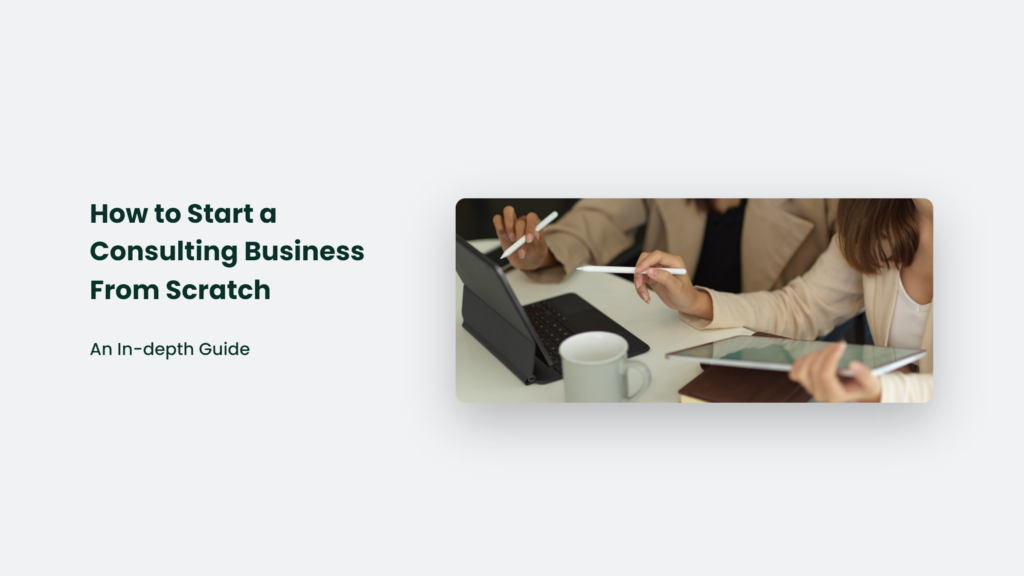Starting a consulting business can be one of the most lucrative and flexible business ventures. As a consultant, you get to be your own boss, choose your clients, and set your own rates and hours. But, like any business, launching a successful consulting firm requires strategy and hard work.
In this comprehensive guide, I’ll walk you through how to start a consulting business from scratch. From picking your niche to landing your first clients and everything in between.
By the end, you’ll have all the tools, tips, and tricks to start raising consulting fees and live on your terms.
So, prepare for the inside scoop on starting a wildly profitable consulting business.

How to Start a Consulting Business:
Step 1: Choose Your Niche
The first step is selecting your niche. It is crucial because it determines who your ideal clients are and what problems you’ll solve for them.
Some popular consulting niches include:
Business strategy
- Marketing and advertising
- Human resources
- Technology and IT
- Finance and Accounting
- Executive Coaching
Brainstorm consulting niches you’re passionate about and have experience in. Avoid super broad niches that are already saturated.
For example, instead of “business consulting,” narrow your focus to something like “restaurant profit strategy.”
It makes you stand out as an expert.
Pro Tip: Look for niches with desperate buyers and complex problems to solve. This lets you charge premium rates.
Once you’ve picked your niche, you can start shaping your consulting business model and offerings.
Step 2: Build Your Arsenal of Solutions
It’s time to develop the products and services you’ll offer clients now. As a consultant, your solutions are your arsenal for dominating your niche.
Some popular consulting offerings include:
Strategic planning
- Assessments and audits
- Process optimization
- Training and coaching
- Ongoing advisory
- Map out unique solutions that solve your target clients’ biggest problems and pains. Get creative and think outside the box.
For example, a restaurant profit consultant could offer:
- 1-Day Restaurant Profit Assessment.
- 12-Week Restaurant Turnaround Program
- Restaurant Manager Training Workshops
A suite of offerings allows you to package and price your services at premium rates.
Pro Tip: Bundle your solutions into high-value packages for maximum profit. People love bundles!
Step 3: Craft Your Signature System
Now, wrap your solutions into a signature system that becomes your calling card. It is the key to standing out from the sea of consultants.
For example, a restaurant profit consultant could have a “Rapid Restaurant Profit System” that includes:
- 1-Day Restaurant Profit Assessment
- 12-Week Restaurant Turnaround Program
- Exclusive Restaurant Profit Toolkit
- 6 Months of Unlimited Email Coaching
See how the system bundles your offerings into an irresistible high-value package?
It allows you to charge premium consulting fees while giving massive value. It’s a win-win.
Pro Tip: Name your system something catchy and descriptive. It helps clients instantly grasp your value.
Step 4: Dial In Your Pricing
Pricing is everything in the consulting biz. The price is too low, and you leave money on the table. Price too high, and you scare away clients.
Some pricing tips:
- Charge by the day or project, not hourly. Hourly undervalues your expertise.
- Structure pricing into tiers like Good-Better-Best. Offer an entry package.
- Charge 50-200% of what you made daily in your last job.
- Raise prices over time as you gain experience and credibility.
- Offer payment plans to make big packages more affordable.
Do not underprice yourself! Consulting is about providing incredible value, not being the cheapest.
Pro Tip: Avoid pricing packages under $2500. Go higher for premium services.
Step 5: Build Your Consulting Website
Your website is the hub for attracting clients and booking sales. Invest time and money into building a high-converting site.
Make sure your website has:
- A memorable brand and domain name.
- A professional design that establishes authority
- Clear messaging about your niche, solutions, and clients
- Strong calls-to-action to contact you and buy your services
- SEO-optimized pages and content
Pro Tip: Use lead magnets like free guides, cheat sheets, and assessments to capture visitor emails.
Step 6: Promote Yourself Online
Once your website is up, it’s time to start spreading the word online. Some effective promotion strategies include:
- Guest posting on industry blogs
- Getting interviewed on podcasts
- Creating YouTube videos
- Hosting webinars or workshops
- Active social media marketing
- Paid ads to your offers
- Optimizing your site for SEO
The goal is to get in front of your ideal clients and position yourself as the expert they want to hire.
Pro Tip: Repurpose your promotional content into an eBook, email course, or checklist to build your email list.
Step 7: Network and Referral Marketing
Consulting is a relationship business. Networking and referrals are powerful ways to build your client roster.
Attend conferences and events to connect with prospects
- Get referrals from existing satisfied clients
- Partner with complementary providers who can refer business
- Join industry associations and chambers of commerce
- Host your events, talks, or workshops
- Build relationships with centers of influence
Pro Tip: Always ask for introductions to decision-makers or potential clients.
Step 8: Refine Your Selling Process
As leads start flowing in, you need a proven process for selling clients. Key steps in the consulting sales process:
- Respond quickly to inquiries
- Jump on intro calls to qualify leads
- Assess their needs and paint a vision of their desired future
- Tailor your solution to solve their specific struggles
- Convey your expertise and credentials
- Provide pricing options and payment plans
- Ask for the sale and close deals!
Pro Tip: Master the art of closing. You make money when clients say “yes.”
Step 9: Overdeliver Value
The key to retention and referrals is overdelivering value. Go above and beyond for your clients.
- Exceed expectations on all projects.
- Check in regularly and be responsive
- Provide additional free resources and advice
- Ask for reviews and testimonials
- Send referral gifts to happy clients
- Offer bonuses for referrals
It builds a reputation for excellence that keeps clients returning while attracting new ones through word-of-mouth.
Step 10: Deliver Projects Flawlessly
Once you’ve landed clients, it’s gone time. You must execute projects smoothly and deliver massive value.
Some tips for flawless consulting project delivery:
- Clearly outline project scope, timeline, and expectations upfront
- Over-communicate throughout the project
- Meet deadlines and honor your commitments
- Manage client expectations along the way
- Deliver high-quality work that exceeds the scope
- Wrap projects with thorough reports and recommendations
Following a proven project management process is crucial for consulting success. It ensures clients get exceptional results.
Pro Tip: Always get the client’s sign-off before finalizing deliverables.
Step 11: Expand Your Services Over Time
As you gain experience, look for opportunities to expand your service offerings. Ways to add new consulting services:
Address related client problems outside your core niche
- Bundle new offerings into your signature system.
- Launch coaching programs, online courses, or membership sites
- Host workshops, conferences, or corporate training
- Create information products like books, eBooks, or video courses.
- Provide done-for-you services like execution and implementation.
Expanding your offerings allows you to provide more value while increasing revenue.
Pro Tip: Before full market launch, test new services with current clients first.
Step 12: Raise Your Rates
As you get more established, you can start raising your consulting rates. Some tips for increasing fees:
- Gradually raise rates for new clients
- Increase prices across the board each year.
- Require higher retainers and project deposits.
- Offer premium packages with higher price points.
- Develop new high-value services to command top dollar.
Your rates should steadily rise as you gain credentials, case studies, and market authority.
Pro Tip: Never lower rates. Offer discounts or bonuses instead.
Frequently Asked Questions:
How much does it cost to start a consulting business?
The costs to start a consulting business can range from $500 to $10,000, depending on your niche and offerings.
Budget for a website, business registration, marketing materials, office supplies, software/tools, and any training or certifications. Many consultants operate their business virtually, so overhead costs are low.
What skills do you need to be a consultant?
Key skills for successful consulting include:
– Expertise and experience in your niche
– Strong problem-solving abilities
– Excellent communication and listening skills
– Project management skills
– Ability to build rapport and relationships
– Business and financial acumen
Conclusion
Starting a profitable consulting business takes vision, grit, and smart strategy. Define your niche, craft compelling offerings, master sales, and relentlessly overdeliver for clients. The rewards for getting it right are tremendous. You can own your time, work when and how you want, and earn an incredible income by solving problems and transforming lives.
This guide provided a blueprint for launching your successful consulting practice. Now, go out there, take action, and start reaping the benefits of entrepreneurial consulting! Let me know if you have any other questions. I’m always happy to help fellow consultants build their business.




